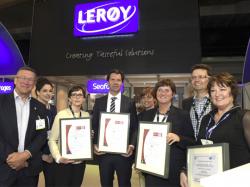More ASC Certified Salmon Soon To Be Available In The Market
May 27, 2014 | 3 min to read

Lerøy Seafood Group and Bureau Veritas hosted a joint ceremony at Seafood Expo Global in Brussels to celebrate that three Lerøy Aurora farms have been certified against the ASC Salmon Standard for responsible aquaculture.
The two latest Lerøy Aurora farms join the three existing Lerøy certified operations, two certified Marine Harvest farms in Norway and Tassal’s site in Australia. The number of ASC certified salmon farms is now eight in total.
An additional eleven farms in Norway, Australia, Canada and Chile are also awaiting the outcome of their assessments.
At the ceremony, the three Lerøy Aurora operations: Årøya, Gourtesjohka and Solheim farms were presented with their official certificates for complying with the ASC standard. The certification was awarded after assessments carried out by Bureau Veritas, an independent and accredited certification body.
Gudrun Gunnarsdottir, Quality Coordinator at Lerøy Aurora said: “It is an honor to receive the ASC certificates on behalf or our three farm sites. At Lerøy Aurora we always strive towards the highest quality, not only of our products, but also in terms of responsible farming methods. Gaining certification against the ASC Salmon Standard provides the guarantee to our customers that our fish has been produced with minimal environmental and social impacts. I look forward to promoting our certified salmon at the Seafood Expo Global and in the future.”
“I am delighted to join Lerøy Seafood Group and Bureau Veritas to recognise the achievement of the three Lerøy Aurora sites. Certification against the robust ASC Salmon Standard demonstrates that these farms have made a commitment to incorporating responsible environmental and social farm practices. I would like to take the opportunity to congratulate Lerøy Aurora and their staff for this accomplishment” said Chris Ninnes, ASC’s CEO.
“The market response since the launch of the ASC salmon programme has been phenomenal. I am pleased to see it continue growing. The rapid expansion secures the availability of ASC certified salmon, which means consumers can now enjoy responsibly farmed certified salmon globally.”
Third party independent verification
Independent third party certifiers audit farms against the ASC standards. Certifiers demonstrate to another independent company, Accreditation Services International (ASI), that they have the skills to undertake assessments. After accreditation they are monitored by ASI to ensure they continue to operate in line with the ASC requirements. Auditors are also required to participate in ASC’s standard specific training; including a mandatory exam to test their understanding which they must pass.
“As an accredited certifier for both ASC farm standards and chain of custody, Bureau Veritas ensures that assessments are independent, and carried out in an open and transparent process, by qualified auditors” said Laurent Galloux, Global Seafood Manager Bureau Veritas. “We decided to be accredited for ASC salmon, trout and shrimp certification, because we think this scheme will be recognised worldwide by the market and consumers. This is only possible if the certification is reliable globally with measurable impact. ASC built a robust process including standards for each species, training and qualification of each auditor, and accreditation of each Certification body with only one accreditation body at global level.”
About the ASC
The Aquaculture Stewardship Council (ASC) is as an independent, not-for-profit organisation founded by World Wildlife Fund (WWF) and The Sustainable Trade Initiative (IDH) in 2010 to manage the certification of responsible fish farming across the globe.
The ASC standards require farm performance to be measured against both environmental and social requirements. Certification is through an independent third party process and (draft) reports are uploaded to the public ASC website.
The on-pack ASC logo guarantees to consumers that the fish they purchase has been farmed with minimal impacts on the environment and on society.
The ASC standard addresses the following seven principles:
– Legal compliance (obeying the law, the legal right to be there)
– Preservation of the natural environment and biodiversity
– Preservation of the water resources and water quality
– Preservation of the diversity of species and wild populations (for example, minimising escapes that could become a threat to wild fish)
– Monitored and responsible use of animal feed and other resources
– Animal health (no unnecessary use of antibiotics and chemicals)
– Social responsibility (for example, no child labour, health and safety of employees, freedom of assembly, community relations).
For more information about ASC please visit www.asc-aqua.org
Source: Aquaculture Stewardship Council
